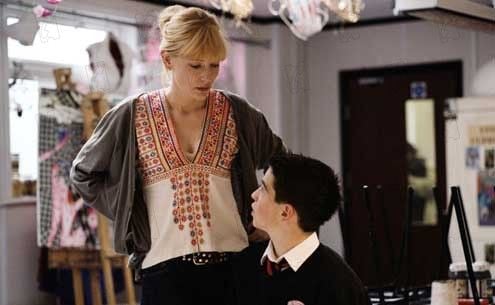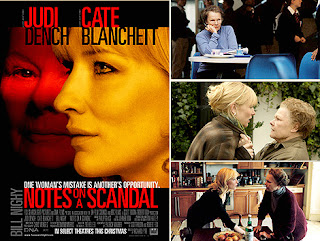Certain stories stay with us for days, making us rethink attitudes, relationships and even the way we see others. This is the case with the disturbing and brilliant film “Notes on a Scandal”, a psychological drama that still provokes intense debates about limits, obsession and power. Currently available on Disney+, the work directed by Richard Eyre offers much more than a conventional scandal — it reveals the darkest structures of human relationships.

From the outset, it becomes clear that this is not an easy film to categorize. Although at first glance it appears to be about a controversial case of inappropriate conduct, the plot goes much further. “Notes on a Scandal” is a journey through a game of emotional manipulation where no one emerges unscathed — not even the viewer.
Synopsis: Far Beyond the Scandal
The story revolves around Barbara Covett (Judi Dench), a lonely and strict high school teacher who is close to retirement and sees her life take a new direction when she meets Sheba Hart (Cate Blanchett), the charming new art teacher. Sheba, with her affable demeanor and youthful charm, quickly attracts the attention of her students, colleagues and, above all, Barbara.
However, what begins as a promising friendship quickly turns into something much darker. Barbara discovers that Sheba is involved in a relationship with one of her students—a fifteen-year-old boy. Rather than reporting the affair immediately, Barbara chooses to keep the scandal a secret, plunging her into a complex web of emotional dependence and veiled blackmail.
So what we see next is the slow and meticulous deconstruction of two women trapped in a cycle of obsession and manipulation. The scandal, far from being just an act, becomes a reflection of the emptiness and need for control that dominate the protagonists.
Judi Dench: A Villain with Deep Layers
It is impossible to talk about “Notes on a Scandal” not to mention Judi Dench's mesmerizing performance. The actress delivers a haunting performance as Barbara Covett, a woman filled with resentment, marked by frustration and an insatiable desire to be needed. Her voice, which narrates excerpts from the diary she obsessively writes, takes us through the most intimate and disturbing thoughts of someone who believes that loneliness is the world's fault, not hers.
In fact, Barbara's diary works as a brilliant device in the script. It exposes her emotional distortions, her delusions and her inability to understand her own feelings. More than just witnessing a scandal, Barbara shapes it, directs it and uses it as a tool to trap Sheba under her emotional control.
Dench's performance earned her a well-deserved Oscar nomination. After all, cinema has rarely presented an antagonist who is so human, so cold and, at the same time, so tragic.
Cate Blanchett: Fragility and Contradiction
On the other hand, Cate Blanchett shines as Sheba Hart, a contradictory, immature and vulnerable woman. Although, at first glance, she seems to have everything under control - a family, a promising career and a youthful appearance - Sheba is, in fact, a restless soul in search of validation.
Her relationship with the student is not only a moral scandal. It is, above all, a silent cry from someone who feels like she is disappearing into the sea of routine and invisibility. Blanchett manages to perfectly balance the naivety, selfishness and fragility of her character, building a figure who does not deserve forgiveness, but who cannot be reduced to a villain either.
Thus, the clash between Dench and Blanchett on stage turns into a true acting lesson. The tension between them is palpable, growing with every look, every silence and every gesture of false empathy. It is in this confrontation that the drama reaches its peak.

Scandal as a Tool of Power
Despite the name, “Notes on a Scandal” is not concerned with the moralization of the forbidden act itself. The focus, in fact, is on the way in which the scandal is used as a weapon. Barbara, upon discovering Sheba's secret, does not immediately report it. Instead, she manipulates events to keep Sheba under control, as if her power over the secret made her indispensable.
In this way, the film invites us to reflect on the perverse use of information. In a society where scandals become headlines, social currency and instruments of destruction, the film alerts us to the fine line between justice and revenge, denunciation and blackmail.
More than that, the script shows that the scandal can also be internal. The real tragedy is not only in the illicit relationship, but in the emotional abysses that each character carries within themselves. The scandal, in this sense, is just the spark that lights the powder keg that is already about to explode.
Soundtrack and Direction: Building Tension with Elegance
In addition to the stunning performances, Richard Eyre's direction and the soundtrack composed by Philip Glass contribute to creating a dense and immersive atmosphere. The music, minimalist and repetitive, acts as a constant presence, almost like Barbara's obsessive thoughts.
The camera choices and cool color palette also help emphasize the characters' isolation. The tight framing, empty school hallways, gray environments, and restrained expressions say much more than words.
Everything, in this drama, is calculated to lead us into a state of silent discomfort. There is no explicit violence, but each scene is imbued with tension. Each gesture, each subtly intoned phrase carries enormous symbolic and emotional weight.
The Mirror Game: Who Manipulates Whom?
As the story progresses, it becomes increasingly difficult to determine who is in control. Although Barbara has discovered the secret and uses it as leverage, it is possible to see that Sheba, in a way, also feeds this dependence. The relationship between the two becomes a game of mirrors, where each one projects onto the other what she would like to have or be.

Therefore, the scandal ceases to be a starting point and becomes a vicious cycle of obsession. Both feed emotionally on the other's presence, even if it slowly destroys them. Manipulation ceases to be an external act and begins to inhabit the most intimate feelings.
And it is in this psychological game that the film achieves its greatest strength. Instead of demonizing or absolving, it exposes. It exposes the rottenness and lets the audience decide who to sympathize with — if that is even possible.
Conclusion: Scandal, Loneliness and Truth
“Notes on a Scandal” is, above all, a profound and disturbing psychological study of the destructive power of loneliness. The drama It offers no easy answers or comfortable redemptions. It forces us to face the depths of the human soul and realize that, often, the greatest scandals are those that no one sees — those that occur within ourselves.
Through unforgettable performances, sharp storytelling and careful direction, the film remains timely and necessary. In times of constant exposure and instant judgment, it reminds us that behind every public scandal there may be an even greater private tragedy.
Available on Disney+, this masterpiece of psychological suspense deserves to be rediscovered by a new generation of viewers. But be careful: it takes courage to face what this film has to say. Because here, the real scandal is not feeling anything at the end.

Don't have this streaming service? Then click the button below and find out how to watch your favorite movies and series for free!

